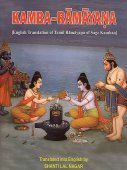Yuddha: 19 definitions
Introduction:
Yuddha means something in Hinduism, Sanskrit, Buddhism, Pali, Marathi, Hindi. If you want to know the exact meaning, history, etymology or English translation of this term then check out the descriptions on this page. Add your comment or reference to a book if you want to contribute to this summary article.
Alternative spellings of this word include Yuddh.
Images (photo gallery)
In Hinduism
Purana and Itihasa (epic history)
Source: archive.org: Puranic EncyclopediaYuddha (युद्ध).—(war) (i) In ancient times in India war was considered a "Rājadharma". A war declared under this law was known as "Dharmayuddha"
(ii) It is forbidden to use a weapon describing it falsely as another weapon. The use of arrows heated in fire, is also against Dharmayuddha.
(iii) It is also against the rules of Dharmayuddha to kill a person who gets down from the chariot, a eunuch, one with joined palms, one who squats on the ground, one who seeks refuge, one who is asleep, one who is naked, an unarmed person, one who has come to witness the fight, one who is fighting with another, one whose weapon is broken, one who is bereaved by the death of a son or other relative, one who is vanquished, one who flees from battle, and one who refuses to attack in return etc.
(iv) If a warrior fleeing from battlefield is killed by his enemy, he carries with him his master’s sins.
(v) All the grace earned by the young man who flees from battle, passes to his master.
(vi) The soldier himself may take all booty in the battle except chariots, horses, elephants, umbrellas, wealth, corn, cows, women, weapons, silver and gold.
(vii) All costly articles, seized in battle, such as gold, silver, jewels etc. are to be handed over to the King, according to the Vedas. (Manusmṛti, Chapter 7).
Source: archive.org: Shiva Purana - English TranslationYuddha (युद्ध) refers to a “battle” (using weapons such as the spear), according to the Śivapurāṇa 2.4.10 (“Boasting of Tāraka”).—Accordingly, as Tāraka-Asura fought with Kārttikeya: “[...] At the blow of the spear, the son of Śiva became unconscious. He regained his consciousness in a few minutes. He was eulogised by the great sages. Kumāra became furious like a maddened lion and was desirous of killing the Asura. The powerful Kumāra hit Tāraka with his spear. Thus both Kumāra and Tāraka equally inflamed and equally well versed in the battle of spears (śakti-yuddha) fought each other. [...]”.

The Purana (पुराण, purāṇas) refers to Sanskrit literature preserving ancient India’s vast cultural history, including historical legends, religious ceremonies, various arts and sciences. The eighteen mahapuranas total over 400,000 shlokas (metrical couplets) and date to at least several centuries BCE.
Jyotisha (astronomy and astrology)
Source: Wisdom Library: Brihat Samhita by Varahamihira1) Yuddha (युद्ध) refers to “war”, according to the Bṛhatsaṃhitā (chapter 3), an encyclopedic Sanskrit work written by Varāhamihira mainly focusing on the science of ancient Indian astronomy astronomy (Jyotiṣa).—Accordingly, “If the sun should appear like a pot; he brings on hunger and death; if he should appear broken, the reigning prince dies; if without rays, mankind will be afflicted with fears; if like a gate, then the capital city, if like an umbrella then the country, will perish. If the sun should appear like a flag staff, or a bow, or quivering or of sharp rays he will bring on wars [i.e., yuddha]; if there should appear black lines on his disc the reigning prince will die by the hand of his own minister”.
2) Yuddha (युद्ध) refers to “conjunctions” (of planets), according to the Bṛhatsaṃhitā (chapter 5).—Accordingly, “Lunar and solar eclipses terminate in ten ways [...] If there should appear either a rainbow, or a comet club-like in shape, people, afflicted with hunger, will suffer from foreign yoke; if there should be either planetary conjunctions [i.e., graha-yuddha] or cometary appearances princes will be at war with one another. If there should occur a fall of good rain within the said period, there will be prosperity in the land and the evils described above will disappear”.

Jyotisha (ज्योतिष, jyotiṣa or jyotish) refers to ‘astronomy’ or “Vedic astrology” and represents the fifth of the six Vedangas (additional sciences to be studied along with the Vedas). Jyotisha concerns itself with the study and prediction of the movements of celestial bodies, in order to calculate the auspicious time for rituals and ceremonies.
Kama-shastra (the science of Love-making)
Source: Shodhganga: Elements of Art and Architecture in the Trtiyakhanda of the Visnudharmottarapurana (kama)Yuddha (युद्ध) refers to “(the art of) fighting”.—Cf. Meṣakukkuṭalāvakayuddhavidhi which refers to the “art of cock fighting, ram fighting and quail fighting”, representing one of the “sixty four kinds of Art”, according to the Kāmasūtra of Vātsyāyaṇa.—Indian tradition, basically includes sixty four Art forms are acknowledged. The references of sixty four kinds of kalā are found in the Bhāgavatapurāṇa, Śaiva-Tantras, Kāmasūtra of Vātsyāyaṇa etc.

Kamashastra (कामशास्त्र, kāmaśāstra) deals with ancient Indian science of love-making, passion, emotions and other related topics dealing with the pleasures of the senses.
Natyashastra (theatrics and dramaturgy)
Source: Shodhganga: Literary estimate of mudraraksasaYuddha (युद्ध) refers to “fighting” which should be avoided on a stage (where a dramatic play is performed).—A Nāṭaka should contain pañcasandhis which indicate five successive stages of the drama. This criterion also is present in the Mudrārākṣasa. [...] In the Sāhityadarpaṇa, Viśvanātha gives a list of certain actions which should not be presented on the stage. These are [e.g., fighting (yuddha)] [...].

Natyashastra (नाट्यशास्त्र, nāṭyaśāstra) refers to both the ancient Indian tradition (shastra) of performing arts, (natya—theatrics, drama, dance, music), as well as the name of a Sanskrit work dealing with these subjects. It also teaches the rules for composing Dramatic plays (nataka), construction and performance of Theater, and Poetic works (kavya).
General definition (in Hinduism)
Source: Wisdom Library: HinduismYuddha (युद्ध) is a Sanskrit word referring to “war”.
Languages of India and abroad
Pali-English dictionary
Source: BuddhaSasana: Concise Pali-English Dictionaryyuddha : (nt.) fight; war; battle.
Source: Sutta: The Pali Text Society's Pali-English DictionaryYuddha, (nt.) (orig. pp. of yujjhati; cp. Vedic yuddha (pp.) and yudh (f.) the fight) war, battle, fight D. I, 6 (daṇḍa° fighting with sticks or weapons); J. III, 541 (id.); Sn. 442 (Dat. yuddhāya); J. VI, 222; Miln. 245 (kilesa°, as pp. : one who fights sin); Mhvs 10, 45 (°atthaṃ for the sake of fighting); 10, 69 (yuddhāya in order to fight); 25, 52 (yuddhāy’āgata); 32, 12 (yuddhaṃ yujjhati); 32, 13 (maccu° fight with death); 33, 42; DhA. II, 154 (malla° fist-fight).—The form yudhāya at Sn. 831 is to be taken as (archaic) Dat. of Vedic yudh (f.), used in sense of an inf. & equal to yuddhāya. Nd1 172 explains as “yuddh’atthāya. ”

Pali is the language of the Tipiṭaka, which is the sacred canon of Theravāda Buddhism and contains much of the Buddha’s speech. Closeley related to Sanskrit, both languages are used interchangeably between religions.
Marathi-English dictionary
Source: DDSA: The Molesworth Marathi and English Dictionaryyuddha (युद्ध).—n (S) Battling, warring, fighting; conflict or a conflict in general. kukkuṭayuddha, mēṣayuddha, gajayuddha Cock-fighting, ram-fighting, elephant-fighting; mallayuddha Wrestling or pugilistic contest; talātalayuddha Fight consisting in slapping of hands mutually against each other's breast; gadāyuddha, caraṇayuddha &c.
Source: DDSA: The Aryabhusan school dictionary, Marathi-Englishyuddha (युद्ध).—n Fighting, battling; conflict.
Marathi is an Indo-European language having over 70 million native speakers people in (predominantly) Maharashtra India. Marathi, like many other Indo-Aryan languages, evolved from early forms of Prakrit, which itself is a subset of Sanskrit, one of the most ancient languages of the world.
Sanskrit dictionary
Source: DDSA: The practical Sanskrit-English dictionaryYuddha (युद्ध).—p. p.
1) Fought, encountered.
2) Conquered, subdued.
-ddham [yudh-bhāvādau kta]
1) War, battle, fight, engagement, contest, struggle, combat; वत्स केयं वार्ता युद्धं युद्धमिति (vatsa keyaṃ vārtā yuddhaṃ yuddhamiti) Uttararāmacarita 6.
2) (In astr.) The opposition or conflict of planets.
Source: Cologne Digital Sanskrit Dictionaries: Shabda-Sagara Sanskrit-English DictionaryYuddha (युद्ध).—n.
(-ddhaṃ) 1. War, battle, contest. 2. Conflict of the planets, (in astronomy.) E. yudh to fight, aff. kta .
Source: Cologne Digital Sanskrit Dictionaries: Cappeller Sanskrit-English DictionaryYuddha (युद्ध).—[adjective] fought; [neuter] fight, battle.
Source: Cologne Digital Sanskrit Dictionaries: Monier-Williams Sanskrit-English Dictionary1) Yuddha (युद्ध):—[from yudh] mfn. fought, encountered, conquered, subdued, [Mahābhārata]
2) [v.s. ...] m. Name of a son of Ugra-sena, [Viṣṇu-purāṇa]
3) [v.s. ...] n. (ifc. f(ā). ) battle, fight, war, [Ṛg-veda] etc. etc.
4) [v.s. ...] m. (in [astronomy]) opposition, conflict of the planets, [Sūryasiddhānta; Varāha-mihira’s Bṛhat-saṃhitā]
Source: DDSA: Paia-sadda-mahannavo; a comprehensive Prakrit Hindi dictionary (S)Yuddha (युद्ध) in the Sanskrit language is related to the Prakrit words: Jujjha, Jujjhia.
[Sanskrit to German]
Sanskrit, also spelled संस्कृतम् (saṃskṛtam), is an ancient language of India commonly seen as the grandmother of the Indo-European language family (even English!). Closely allied with Prakrit and Pali, Sanskrit is more exhaustive in both grammar and terms and has the most extensive collection of literature in the world, greatly surpassing its sister-languages Greek and Latin.
Hindi dictionary
Source: DDSA: A practical Hindi-English dictionaryYuddha (युद्ध) [Also spelled yuddh]:—(nm) war/warfare; battle; fight/fighting; combat, hostilities; ~[kārī] fighting/fighter; combating/combatant; -[kāla] wartime; period of fighting; -[kṣetra] battle-field, theatre of war; -[nīti] strategy; -[pota] warship, man of war; ~[pravaṇa] bellicose, pugnacious, martial, militant; ~[pravaṇatā] bellicosity, pugnacity; ~[pravīṇa] expert/skilled in warfare; ~[priya] a warmonger; bellicose, pugnacious, militant, martial; •[tā] war-mongering; bellicosity, pugnaciousness; ~[baṃdī] a prisoner of war; cesssation of hostilities; -[bhūmi] the battlefield; -[maṃtrī] minister for war; ~[rata] belligerant; -[vijñāna/śāstra] science of warfare; military science; -[vidyā] art of warfare; -[virāma] cease-fire; •[saṃdhi] cease-fire pact, cease-fire; agreement; -[śakti] fighting potential, power/capacity to wage a war; -[saṃbaṃdhī] military; pertaining to war/battle/fighting; -[sthagana] cessation of hostilities.
...
Kannada-English dictionary
Source: Alar: Kannada-English corpusYuddha (ಯುದ್ಧ):—[noun] open armed conflict between two military forces; a war.
Kannada is a Dravidian language (as opposed to the Indo-European language family) mainly spoken in the southwestern region of India.
See also (Relevant definitions)
Starts with (+81): Yuddha-boneta, Yuddhaaparadhi, Yuddhabandi, Yuddhabhu, Yuddhabhumi, Yuddhacarya, Yuddhacharya, Yuddhacintamani, Yuddhadarpa, Yuddhadharma, Yuddhadhvan, Yuddhadhvana, Yuddhadhyana, Yuddhadurmada, Yuddhadyuta, Yuddhagandharva, Yuddhajaya, Yuddhajayaprakasha, Yuddhajayarnava, Yuddhajayopaya.
Ends with (+75): Abhyuddha, Adharmayuddha, Ajayuddha, Amshumardanayuddha, Amshuvirodhayuddha, Amtaryuddha, Anandacem Yuddha, Anandacem-yuddha, Andolikaniyuddha, Anuyuddha, Anyonyayuddha, Apasavyayuddha, Asavyayuddha, Assayuddha, Astrayuddha, Atyuddha, Ayuddha, Bahuyuddha, Bharatayuddha, Bhedayuddha.
Full-text (+360): Mallayuddha, Yuddhasara, Yuddharanga, Yuddhamaya, Yuddhavastu, Yuddhaka, Mitrayuddha, Mushtiyuddha, Dvairatha, Yuddhonmatta, Dolayuddha, Yuddhajayopaya, Yuddhamedini, Yuddhabhu, Yuddhakarin, Yuddhavant, Vadayuddha, Yuddhakala, Bahuyuddha, Yuddhabhumi.
Relevant text
Search found 56 books and stories containing Yuddha; (plurals include: Yuddhas). You can also click to the full overview containing English textual excerpts. Below are direct links for the most relevant articles:
Garga Samhita (English) (by Danavir Goswami)
Verse 6.6.31 < [Chapter 6 - The Yādavas’ Victory When Śrī Rukmiṇī is Kidnapped]
Verse 1.6.50 < [Chapter 6 - Description of Kaṃsa’s Strength]
Verse 2.23.12 < [Chapter 23 - The Killing of Śaṅkhacūḍa During the Rāsa-dance Pastime]
Bhakti-rasamrta-sindhu (by Śrīla Rūpa Gosvāmī)
Verse 2.1.207 < [Part 1 - Ecstatic Excitants (vibhāva)]
Verse 4.3.4 < [Part 3 - Chivalry (vīrya-rasa)]
Verse 4.3.2 < [Part 3 - Chivalry (vīrya-rasa)]
The Bobbili Folk Epic < [October – December 1991]
Birth Episode of Sita in Adhyathma Ramayana < [October – December, 2001]
Sita: Power, Penance, Promise - An Introduction < [October – December, 1988]
Shrimad Bhagavad-gita (by Narayana Gosvami)
Verse 2.32 < [Chapter 2 - Sāṅkhya-yoga (Yoga through distinguishing the Soul from the Body)]
Verses 1.8-9 < [Chapter 1 - Sainya-Darśana (Observing the Armies)]
Ramayana of Valmiki (by Hari Prasad Shastri)
Manusmriti with the Commentary of Medhatithi (by Ganganatha Jha)
Verse 7.199 < [Section XIII - War]
Related products



